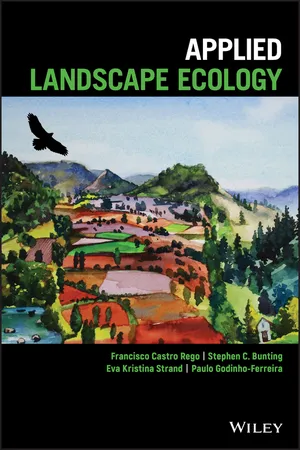
Applied Landscape Ecology
- English
- ePUB (mobile friendly)
- Available on iOS & Android
Applied Landscape Ecology
About this book
An insightful guide to the concepts and practices of modern landscape ecology
Elements of geography, conservation biology, soil science and other disciplines factor into landscape ecology's rich analyses of the ecological and environmental forces at play across different terrains. With its unique, organism-oriented approach to the subject, Applied Landscape Ecology considers the effects of ecological processes upon particular species and places its findings within the context of larger-scale concerns. Students, researchers, and practitioners alike will find this a rewarding and instructive read that offers practical and detailed information on the latest methods and technologies used in the field today.
This essential resource:
- Takes an interdisciplinary approach to landscape ecology
- Examines the subject within the contexts of specific organisms
- Covers cutting-edge technologies and methods
- Represents a collaboration between an international team of landscape ecology experts
- Comes with 25 exercises that are freely available from the book companion site
Whether new to the practice or an established ecologist, anyone with an interest in this exciting and developing field should have a copy of Applied Landscape Ecology at their disposal.
Tools to learn more effectively

Saving Books

Keyword Search

Annotating Text

Listen to it instead
Information
1
Concepts and Approaches in Landscape Ecology
1.1 The Historical Development of Landscape Ecology as a Science



Table of contents
- Cover
- Table of Contents
- Foreword
- Preface
- 1 Concepts and Approaches in Landscape Ecology
- 2 Points as Landscape Elements
- 3 Linear Elements and Networks
- 4 Patches and Their Interactions
- 5 The Vertical Dimension of Landscapes
- 6 Movements Through Landscapes
- 7 Landscape Composition, Diversity, and Habitat Selection
- 8 Landscape Pattern: Composition and Configuration
- 9 Landscape Dynamics
- 10 From Landscape Ecology to Landscape Management
- Appendix A: Description of Notation Used in Formulae and Metrics
- Index
- End User License Agreement
Frequently asked questions
- Essential is ideal for learners and professionals who enjoy exploring a wide range of subjects. Access the Essential Library with 800,000+ trusted titles and best-sellers across business, personal growth, and the humanities. Includes unlimited reading time and Standard Read Aloud voice.
- Complete: Perfect for advanced learners and researchers needing full, unrestricted access. Unlock 1.4M+ books across hundreds of subjects, including academic and specialized titles. The Complete Plan also includes advanced features like Premium Read Aloud and Research Assistant.
Please note we cannot support devices running on iOS 13 and Android 7 or earlier. Learn more about using the app